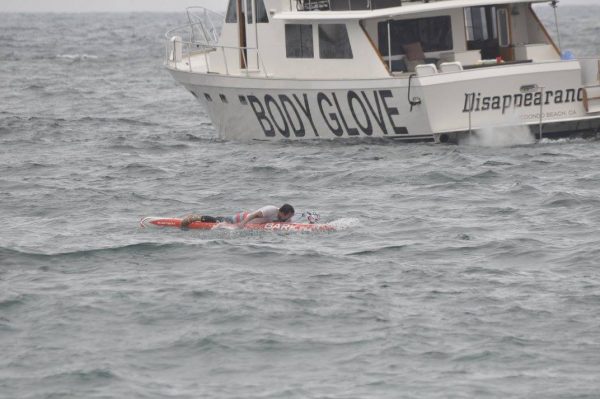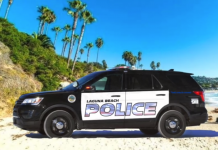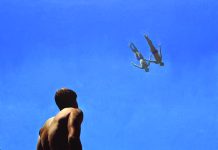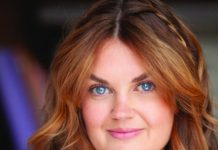When David Skarman, a Laguna waterman and Emerald Bay reserve fire captain, decided last spring to compete in the Catalina Classic Paddleboard Race, which crosses 32 miles of open ocean, he could not have predicted what an endurance test it would turn out to be.

After a 27-year hiatus from the competition, he devoted every spare hour for months to train for the race last month. Skarman won the race in 1989 and 1990 and placed fourth in 1991. At 55, Skarman’s goal was to finish in seven hours, matching his winning time in the 1989 race, and to raise some money for charity along the way.
Prior to the race, in a self imposed condition, Skarman promised supporters that if he failed to finish they need not fulfill their pledges on his behalf to Mauli Ola Foundation, the non-profit that teaches kids with cystic fibrosis to surf.
Weather conditions at the start of the race on Aug. 27 were “a little weird with the wind and overcast, which we all expected to calm as the day progressed, but the high pressure that was expected never showed and the conditions slowly fell apart as the day went on,” said Skarman.
The predicted heat wave never materialized to burn off the thick marine layer. Contenders, including top watermen from Hawaii, France, Canada, Tahiti and mainland Australia, also faced a strong southerly current once clear of Twin Harbors where the race began. “You could see the dread in the faces of guys as you came upon them, all thinking this is not what any of us expected,” Skarman said in an email recapping the race.
The first leg is a 23-mile paddle from the isthmus on Catalina Island across a shipping channel to a buoy known as R-10, off Palos Verdes’ Bluff Cove. Sharks are often present. The final seven miles that parallel the coast are usually the worst and bring finishers to the Manhattan Beach Pier.
“The strategy of going from knee to prone was thrown off because it was so difficult to maintain the knee position in the chop. This is where the stock boards prevailed. The unlimited boards were struggling,” said the waterman, who relied on a stock board 12 feet long and weighing 20 pounds. Unlimited boards can be different sizes and allow variances such as foot controlled rudders and tillers.
In the home stretch “the wind and side chop plus the rebound swell coming off Palos Verdes began to push against me. Slowly racers began to tap out, or be pulled from the water. One by one guys just hit the wall. Anyone who planned for six hours was going to do seven and anyone who planned seven was going to do eight. At about six hours, guys’ music systems began to run out of power and that small component of motivation was now gone,” said Skarman.
He ultimately finished in seven hours, 53 minutes, 15th in the stock category on a Bark Commander board. The winner, Max First, finished in five hours, 55 minutes using a non-stock board. His time was 30 minutes slower than his winning time last year.
Skarman’s time qualified him for participation in next year’s race. “The mental drain and physical recovery was tough,” said Skarman, who nevertheless seems to be leaning toward repeating the feat again next year.
If so, perhaps the Mauli Ola foundation can count on another $3,500 contribution as a result of Skarman’s efforts on land and sea.
“It was pretty cool to learn that Dave chose us as he was our surf team coach at Laguna Beach High School back in ’87 and ’88, and nurtured our own passion for the ocean and ocean activities,” said James Dunlop, co-founder and president of Mauli Ola. Other board members include the founder’s brother, Charles Dunlop, Jason Steris and Jeff Booth, who graduated from LBHS in ’88 and ’87 and were coached by Skarman.
“Now that our current passion is to educate and introduce patients to ocean activities as a natural treatment for a severe genetic disorder … it feels a bit like a full circle,” Dunlop said.




